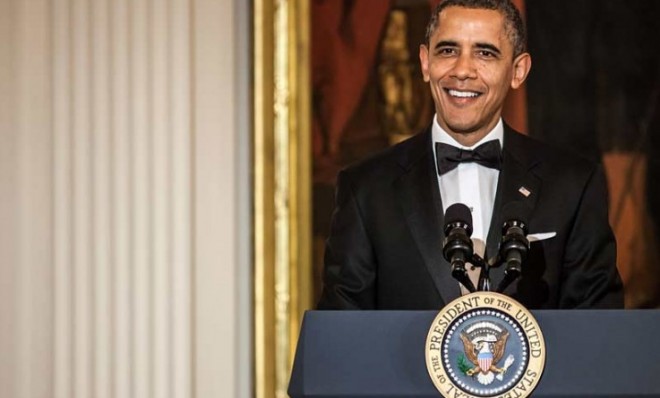5 political realities about the 'fiscal cliff'
The chances for a deal are very high


A free daily email with the biggest news stories of the day – and the best features from TheWeek.com
You are now subscribed
Your newsletter sign-up was successful
As you wade through the often confusing political posturing over the impending expiration of the Bush tax cuts and the automatic budget "sequester," consider the following political dynamics that will determine the outcome.
1. President Obama's swagger. More than just a post-election glow, Obama has actual leverage over Republicans, and he is not going to waste it. Some pundits say that Obama's newly confident negotiating posture is the result of lessons learned during the first term wrestling over the debt limit and budgets: He could offer the farm for free and Republicans wouldn't accept it. But Obama was genuinely constrained by the political realities of the time, much more so than he is today. The economy was in a more precarious state; the options Obama had for stimulus were few; his own party was under assault from the Tea Party movement over deficit spending, and the health care battle had exhausted Hill Democrats. Today, Obama can afford to be more confident. He has no re-election ahead of him; his time threshold for action is much longer. The economy is better.
2. Americans support Democratic policies. To be fair, Americans supported Democratic policies during the last round of these fights; a balanced approach to deficit reduction that supported taxing the wealthy more while slowly reducing the deficit relative to the size of the economy. But the election was in many ways an explicit referendum on economic policy. The Democratic candidate ran on the issue of raising tax rates (or letting the Bush rates for upper-income earners expire), where Republicans ran on significantly cutting spending. Obama could not marshal public opinion that was already in his favor before; it is much easier for him to do so now.
The Week
Escape your echo chamber. Get the facts behind the news, plus analysis from multiple perspectives.

Sign up for The Week's Free Newsletters
From our morning news briefing to a weekly Good News Newsletter, get the best of The Week delivered directly to your inbox.
From our morning news briefing to a weekly Good News Newsletter, get the best of The Week delivered directly to your inbox.
3. John Boehner wants a decent legacy. If Boehner were to retire today, he would be an historical irrelevancy: a decent man in over his head who could not herd cats, much less his own conference. A decent legacy means a deal. A deal means compromise in the end. Boehner has a lot to do before he can compromise. He will absolutely be within his rights to represent the opinions of Republicans until the last minute; at that point, he will either become a Speaker with a legacy worth recognizing, or he will be redundant.
4. Democrats have more wiggle room. Where Republicans are constrained by the Norquist tax pledge and by the unpopularity of their specific tax cut proposals, Democrats have the following political/policy factors working in their favor: (a) Obamacare slowed the growth of Medicare spending, as Mitt Romney knows full well; (b) the Democratic caucus is more amenable to further adjustments to Medicare and Medicaid than they are willing to publicly admit; and (c) the tax cuts expire automatically.
5. Obama's proposal is not that radical. The economy needs continued stimulus, and Obama has merely proposed very, very creeping austerity. The expiring tax cuts will raise revenue, but aside from unemployment insurance extensions and arguing for a renewal of his payroll tax cuts, he's proposed only $50 billion worth of additional immediate spending. The rest of the "more" will come in very slowly and it will be offset by cuts. Republicans can take some solace knowing that the table they set in 2010 (or, you could argue, by hastening the economic collapse in 2008), Obama's best option is probably adequate at best from an historical perspective.
So — what do these factors tell us about the chances of a deal? I'd say there's a pretty decent chance of one. It is hard to see Republicans rolling over and becoming Keynesians, agreeing to significant new stimulus and abandoning their appetite for spending reductions. But it is hard to see how the year begins with a $2,000 tax hike for middle class Americans. It is true that Washington knows what to do; they haven't figured out how to do it just yet.
A free daily email with the biggest news stories of the day – and the best features from TheWeek.com
Marc Ambinder is TheWeek.com's editor-at-large. He is the author, with D.B. Grady, of The Command and Deep State: Inside the Government Secrecy Industry. Marc is also a contributing editor for The Atlantic and GQ. Formerly, he served as White House correspondent for National Journal, chief political consultant for CBS News, and politics editor at The Atlantic. Marc is a 2001 graduate of Harvard. He is married to Michael Park, a corporate strategy consultant, and lives in Los Angeles.
-
 How the FCC’s ‘equal time’ rule works
How the FCC’s ‘equal time’ rule worksIn the Spotlight The law is at the heart of the Colbert-CBS conflict
-
 What is the endgame in the DHS shutdown?
What is the endgame in the DHS shutdown?Today’s Big Question Democrats want to rein in ICE’s immigration crackdown
-
 ‘Poor time management isn’t just an inconvenience’
‘Poor time management isn’t just an inconvenience’Instant Opinion Opinion, comment and editorials of the day
